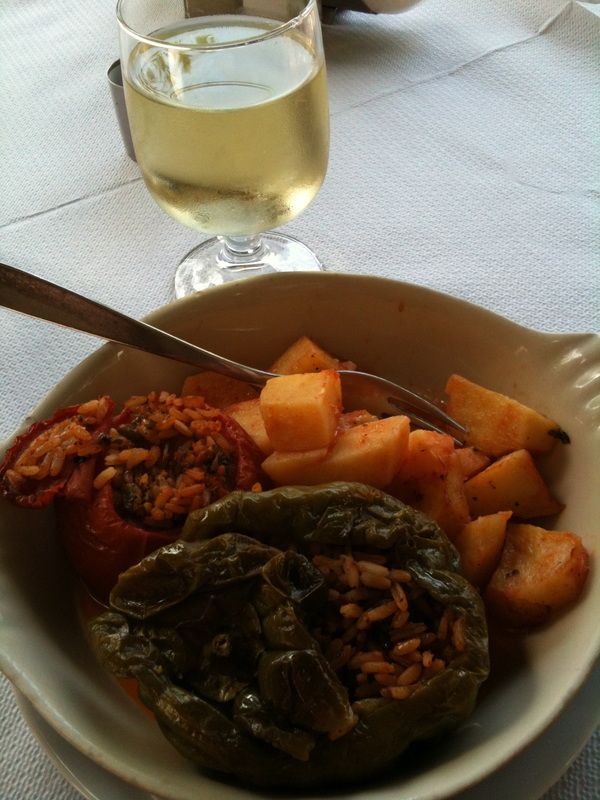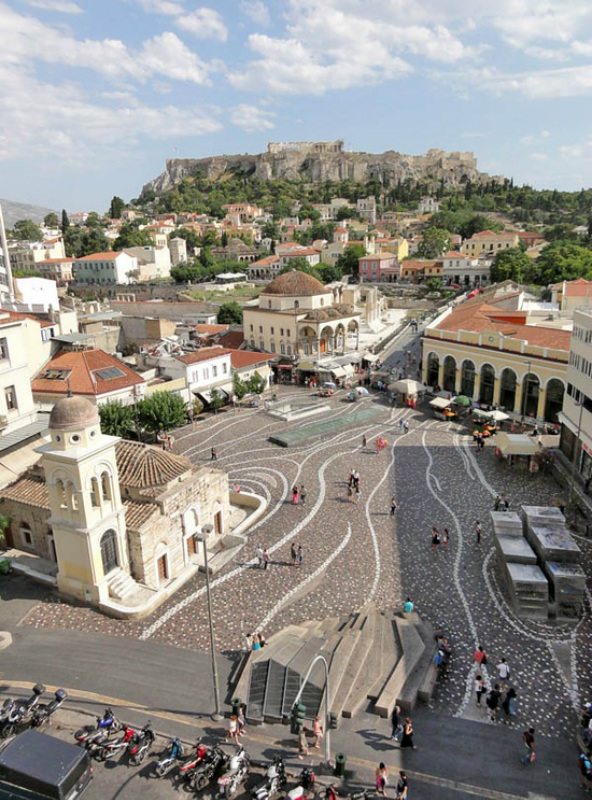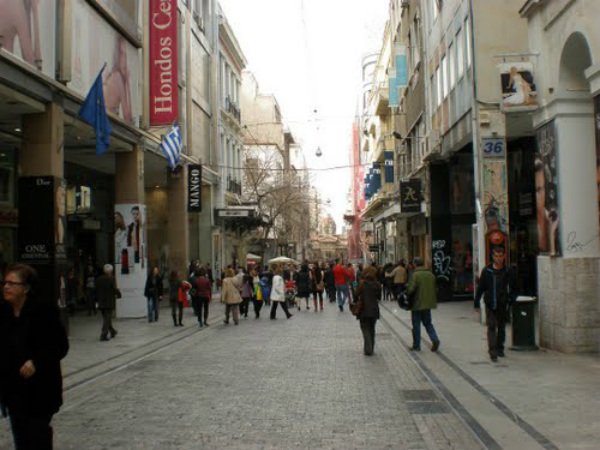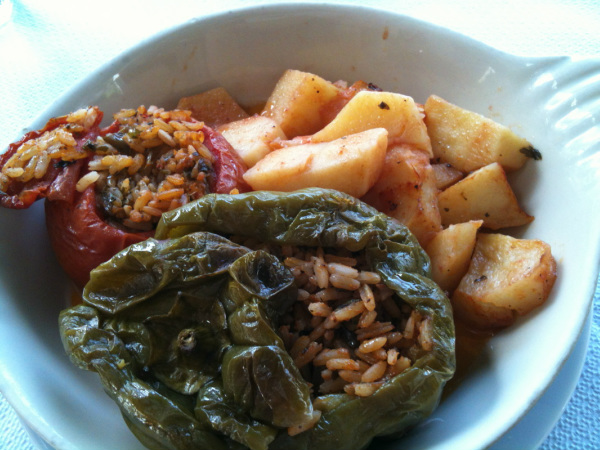You met my wonderful friend Molly McCluskey last month and she's back with another fantastic post. She's still in Europe and still being awesome! Today, on #WanderWednesday, she takes us to Greece.
“You make this dish for your Greek husband, and he will love you forever,” Kostas tells me. He pauses, frowns a little, then adds, “But you won’t have a Greek husband. I disapprove.”
Passersby might have suspected I’ve asked for advice on finding a husband, Greek or otherwise, or that Kostas and I regularly have such conversations, so easy does the advice come. But, no. Aside from general pleasantries, this is the first conversation Kostas and I have had. I’ve asked him, the son of the owner of my favorite restaurant in Greece, to teach me how to make stuffed tomatoes and peppers.
“It’s easy,” Kostas says, the way he might have said, “It's right in front of you,” as though I am asking him to pass me the salt, and not teach me how to make the traditional dish that’s captivated me. He says it melodically, as he’s said everything since I’ve started going to his father’s restaurant. It’s EA-zee. Although I haven’t picked up much Greek, I’ve learned to mimic the rhythm in English, and so I respond in kind, “TELL me.”
Since arriving in Athens two months earlier, I’d relentlessly asked people for recommendations on Greek cooking classes. Without fail, each of them had shrugged and said, “I’ll take you home to my mother. She’ll teach you.” I never quite knew what to make of the offers, but regardless of any hidden motivation, not a single one came to fruition. The apartment I’d rented has cookbooks in it, of course, but I find them daunting. The recipes I’d found online vary so greatly I don’t trust them. I get the sense that this dish, like many others, is best not made from a recipe at all, that people just intrinsically know how to make it. But time is passing by, spring is turning into summer, and still I don’t know. So I beg Kostas to teach me.
He agrees easily, seemingly surprised only that it’s something I don’t already know. I sit, notebook and pen in hand, half-eaten tomatoes and peppers in front of me, my wine glass nearly empty. I wait, and he tells me, not about tomatoes and peppers, the potatoes surrounding them already devoured. But before I learn one thing, it seems, I must learn another.
“We have a saying in Greece,” Kostas tells me. “You must find a shoe from your own land in order for it to fit.”
He’s not smiling as he says this, so I can’t be sure if he’s teasing me or not. It sounds like something that would be a tease; after all, is the woman the shoe in this scenario? But unlike the usual waiter, a heartbreakingly handsome man with a beaming smile who has teased me before, Kostas is the thoughtful, serious type. We’ve exchanged passing greetings before but never jokes. And I think, perhaps, after all, he is not teasing. I am a shoe.
“Greek men,” he tells me with that same melody, “are mentally incapable of loving and appreciating a woman from another land.” Despite my insistence that I’m in Athens because I love the city, the staff at the restaurant suspect I’m here because of a relationship. After all, who suddenly decides they want to live in Greece? And if Greece, why Athens instead of one of the famed islands, if not for a lover? I’ve given up attempting to convince them, and so I take Kostas’s words as a warning, but a kind one, like one a cousin or an uncle would give. It’s the same way I’ve taken the relentless offers to feed me (“You’re too skinny!”), the waiters and waitresses who brought desserts I hadn’t ordered or an extra glass of wine. Food has been at the center of my time in Greece, and in my and there was no greater souvenir than stuffed tomatoes and peppers. I wanted to take them home with me.
Passersby might have suspected I’ve asked for advice on finding a husband, Greek or otherwise, or that Kostas and I regularly have such conversations, so easy does the advice come. But, no. Aside from general pleasantries, this is the first conversation Kostas and I have had. I’ve asked him, the son of the owner of my favorite restaurant in Greece, to teach me how to make stuffed tomatoes and peppers.
“It’s easy,” Kostas says, the way he might have said, “It's right in front of you,” as though I am asking him to pass me the salt, and not teach me how to make the traditional dish that’s captivated me. He says it melodically, as he’s said everything since I’ve started going to his father’s restaurant. It’s EA-zee. Although I haven’t picked up much Greek, I’ve learned to mimic the rhythm in English, and so I respond in kind, “TELL me.”
Since arriving in Athens two months earlier, I’d relentlessly asked people for recommendations on Greek cooking classes. Without fail, each of them had shrugged and said, “I’ll take you home to my mother. She’ll teach you.” I never quite knew what to make of the offers, but regardless of any hidden motivation, not a single one came to fruition. The apartment I’d rented has cookbooks in it, of course, but I find them daunting. The recipes I’d found online vary so greatly I don’t trust them. I get the sense that this dish, like many others, is best not made from a recipe at all, that people just intrinsically know how to make it. But time is passing by, spring is turning into summer, and still I don’t know. So I beg Kostas to teach me.
He agrees easily, seemingly surprised only that it’s something I don’t already know. I sit, notebook and pen in hand, half-eaten tomatoes and peppers in front of me, my wine glass nearly empty. I wait, and he tells me, not about tomatoes and peppers, the potatoes surrounding them already devoured. But before I learn one thing, it seems, I must learn another.
“We have a saying in Greece,” Kostas tells me. “You must find a shoe from your own land in order for it to fit.”
He’s not smiling as he says this, so I can’t be sure if he’s teasing me or not. It sounds like something that would be a tease; after all, is the woman the shoe in this scenario? But unlike the usual waiter, a heartbreakingly handsome man with a beaming smile who has teased me before, Kostas is the thoughtful, serious type. We’ve exchanged passing greetings before but never jokes. And I think, perhaps, after all, he is not teasing. I am a shoe.
“Greek men,” he tells me with that same melody, “are mentally incapable of loving and appreciating a woman from another land.” Despite my insistence that I’m in Athens because I love the city, the staff at the restaurant suspect I’m here because of a relationship. After all, who suddenly decides they want to live in Greece? And if Greece, why Athens instead of one of the famed islands, if not for a lover? I’ve given up attempting to convince them, and so I take Kostas’s words as a warning, but a kind one, like one a cousin or an uncle would give. It’s the same way I’ve taken the relentless offers to feed me (“You’re too skinny!”), the waiters and waitresses who brought desserts I hadn’t ordered or an extra glass of wine. Food has been at the center of my time in Greece, and in my and there was no greater souvenir than stuffed tomatoes and peppers. I wanted to take them home with me.
I’d been eating it at least once a week for the past two months, almost always at Café Metro. Some days I ate only that, the stuffed tomatoes and peppers, surrounded by chopped potatoes. Some days I pair it with a glass of wine and dessert. I’d also discovered a salad called the Rocca Salad which was better than anything calling itself a salad had a right to be; shaved parmesan and pine nuts and tomatoes with some sort of vinaigrette that begs to be mopped up with crusty bread. I was proud when I could order those dishes in Greek, complete with a please and a thank you. The waiters were gracious enough never to let on just how inadequate my Greek was, and so I returned week after week.
Café Metro sits on Monastiraki Square, teeming with tourists and vendors and locals. In the center of the square are two fruit carts, immediately next to each other in proximity that defies logic, given the size of the square and the amount of animosity between them.
Café Metro sits on Monastiraki Square, teeming with tourists and vendors and locals. In the center of the square are two fruit carts, immediately next to each other in proximity that defies logic, given the size of the square and the amount of animosity between them.
Monastiraki is the perfect place for me. I can walk from my apartment in Pagrati, down past Syntagma Square with its changing ceremonial guards, and soldiers armed with machine guns, past the shops on Ermou, through Plaka, and into Monastiraki Square. It was a lovely walk after a day of writing. Sometimes I’d walk past Monastiraki to Thissio, get a coffee and watch the sunset against the Acropolis.
There are other restaurants, of course, piled one on top of the other from Plaka to Thissio and beyond. Competition for customers is so intense that waiters and managers stand out front, clap their hands, and say, “Please,” as they gesture to the menu on a stand near the entrance. I’d chosen Café Metro the first day because it was directly on the square; the front tables were outside of the portico and in the square itself, and a diner eating tomatoes and peppers had caught my eye. My stomach growled at the sight of it, and that was the end of it.
It was love.
After I’d left Greece for the first time, my memories were broken into chapters; each marked by restaurants and the dishes I ate in them. Friends were remembered by where we dined. The place in the Gas District that serves champagne chocolate cake. The waterfront restaurant in Piraeus that wowed me with a nut cake. The first real Greek salad I ever had down a side alley I could never find again. But stuffed tomatoes and peppers is the only Greek recipe I’ve ever attempted on my own.
And this is how it’s made.
Take a tomato and a pepper and scoop out the hearts until you’re left with the cups. Put the shells in a tray, and put cut tomatoes around the sides of the pan. Cook about twenty minutes at approximately 360 degrees but keep an eye out; the shells should still be hard enough to hold the stuffing. Put the heart of the tomato in a blender with four tablespoons of olive oil, one glass of water, some sat and pepper and one cup of cooked rice. Put the rice mixture inside the pepper and tomato with a little olive oil and enough water to cover about a quarter of the potatoes. Lightly cover with tin foil and cook for one and a half hours. Serve warm or cold, sprinkled with basil and some feta cheese on the side.
It was love.
After I’d left Greece for the first time, my memories were broken into chapters; each marked by restaurants and the dishes I ate in them. Friends were remembered by where we dined. The place in the Gas District that serves champagne chocolate cake. The waterfront restaurant in Piraeus that wowed me with a nut cake. The first real Greek salad I ever had down a side alley I could never find again. But stuffed tomatoes and peppers is the only Greek recipe I’ve ever attempted on my own.
And this is how it’s made.
Take a tomato and a pepper and scoop out the hearts until you’re left with the cups. Put the shells in a tray, and put cut tomatoes around the sides of the pan. Cook about twenty minutes at approximately 360 degrees but keep an eye out; the shells should still be hard enough to hold the stuffing. Put the heart of the tomato in a blender with four tablespoons of olive oil, one glass of water, some sat and pepper and one cup of cooked rice. Put the rice mixture inside the pepper and tomato with a little olive oil and enough water to cover about a quarter of the potatoes. Lightly cover with tin foil and cook for one and a half hours. Serve warm or cold, sprinkled with basil and some feta cheese on the side.
Despite my best efforts, I’ve never been able to duplicate the dish. It lacks the key ingredients; the bustle of Monastiraki, the arguing of the fruit cart vendors, the way the air smells in spring in Athens, the stern warnings about dating Greek men. I’ve tried, repeatedly, but give up.
And so I go back to Athens, and sit at a table at Café Metro overlooking Monastiraki, and order stuffed tomatoes and peppers and a glass of wine. I laugh with the handsome waiter who miraculously remembers me, and wave to Kostas in the back, who doesn’t seem to. I think, This is how one makes stuffed peppers and tomatoes. And I approve.
Café Metro is located at 5 Monastiraki Square, Athens, Greece, and is open daily from 7 am until midnight.
Molly McCluskey is a full-time freelance writer who, when not traveling, is based in Washington, D.C. She’s currently living in Europe. Follow her on Twitter @MollyEMcCluskey.
And so I go back to Athens, and sit at a table at Café Metro overlooking Monastiraki, and order stuffed tomatoes and peppers and a glass of wine. I laugh with the handsome waiter who miraculously remembers me, and wave to Kostas in the back, who doesn’t seem to. I think, This is how one makes stuffed peppers and tomatoes. And I approve.
Café Metro is located at 5 Monastiraki Square, Athens, Greece, and is open daily from 7 am until midnight.
Molly McCluskey is a full-time freelance writer who, when not traveling, is based in Washington, D.C. She’s currently living in Europe. Follow her on Twitter @MollyEMcCluskey.






 RSS Feed
RSS Feed
